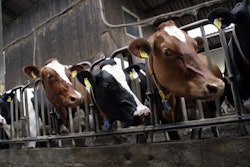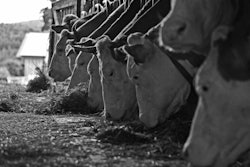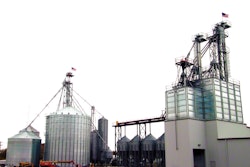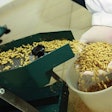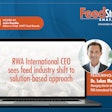The Institute for Feed Education and Research (IFEEDER) is committed to supporting education and research initiatives to make all aspects of the food and feed production industry sustainable well into the future, and with the ever-growing population, research is needed now more than ever.
In the next 40 years and beyond, the world’s population is expected to grow by almost 2.5 billion people and food production will need to double. IFEEDER, the American Feed Industry Association’s 501(c)(3) charitable organization, collectively represents the food and feed production industries in the U.S., and is committed to supporting critical education and research activities needed to allow the food and feed-production industries to meet the increasing challenge of feeding over 9 billion people worldwide by 2050.
Seeing a vital need to answer the question of how to provide safe, affordable food and feed to sustain the additional 2.5 billion people, IFEEDER has focused a large amount of its efforts to research. Since its creation in 2009, the foundation has awarded several student scholarships, donated grants to the National Research Council, partially funded livestock research projects and contributed to youth educational projects.
Most recently, IFEEDER announced the creation of its own research project, awarding its first three-year university research project grant to Mark Hanigan, Ph.D., the David R. & Margret Lincicome professor at Virginia Tech University.
The three-year research grant
Earlier this year IFEEDER sought requests for proposals (RFPs) from land grant universities, federal research entities and other related research organizations for its first research grant project.
“After six years of initial growth, the IFEEDER trustees moved methodically to approve its Research Committee’s recommendations for soliciting proposals for bench research,” said Richard Sellers, IFEEDER secretary.
“This led to IFEEDER’s first RFP for research based on the general topics of Legislative and Regulatory Issues; Feed Safety/Food Safety; Nutrition (NRC and other) and Health (wellbeing); and Sustainability (environmental, economic and social), and any project needed to be applicable to the feed industry.”
The 12 applicants from 11 universities were asked to follow the specific parameters, requirements and submission points carefully outlined by IFEEDER’s research committee. In addition, each proposal was to fit within one of IFEEDER’s four main focus areas, including:
- Legislative and Regulatory Issues
- Feed Safety/ Food Safety
- Animal Nutrition and Health
- Sustainability – environmental, economic, social
The suggested categories tie into IFEEDER’s mission to help shape the future as a way to feed the rising population. Initially, the grant will allow for targeted food and feed research, to be followed by education for all stakeholders in the industry.
Hanigan’s research
Dr. Hanigan, the recipient of the IFEEDER grant, is the David R. & Margret Lincicome professor in the College of Agriculture and Life Sciences at Virginia Tech. His industry specific project proposal, “Assessing Intestinal Absorption of Amino Acids from Various Feedstuffs” was selected because of the potential improvements it will have on the American feed industry. Specifically, his proposed project will look at the impact on nutrition of the animal, health of the animal and aid in the sustainability of the industry, from both an environmental and social aspect.
At Virginia Tech, Dr. Hanigan and his laboratory group are currently working on five projects, all which are aimed at making improvements in feed efficiency, which “reduce the impact of the animals on the environment.” Dr. Hanigan’s current five projects are:
- Quantification of the mechanisms controlling amino acid metabolism and protein synthesis in lactating mammary tissue.
- Identification of animals with improved feed efficiency.
- Identification of mechanisms associated with metabolic programming in ruminants.
- Improvement of models of energy and amino acid metabolism and associated predictions of greenhouse gas production.
- Assessment of the effects of health status on pig growth, manure composition, and greenhouse gas production.
Dr. Hanigan’s research has two significant impacts, both relating to the future of agriculture: The improved knowledge of nitrogen metabolism in ruminants enables enhanced production of milk proteins, and the capacity for improved nitrogen utilization reduces the impact of animal production on the environment.
In addition to contributing to food and feed specific research, IFEEDER’s university research grant is bringing together powerful minds from across the nation with the goal of sustainably feeding the world.
“Industry representatives, university scientists and feed industry consultants are the backbone of progress for the feed industry,” said Chad Risley, Ph.D., CEO of Berg + Schmidt America, who chairs IFEEDER’s research committee. “Our commitments to research, education and sustainability for the robust future of animal feed and the needs of a growing world population, compel us to collaborate closely with allied groups for ideas and answers.”
As the three-year university research project grant recipient, Dr. Hanigan will receive up to $75,000 in three installments over the course of the next three years.
Looking to the future
Moving forward, Sellers said the IFEEDER research committee is “further examining the remaining proposals received and working with its trustees to determine if additional funding is available to approve one or more of those remaining projects.”
“IFEEDER is also looking at several proposals from AFIA on an FDA/AAFCO ingredient approval process survey; a VFD survey to determine the number and dollar volume of drug premixes in the marketplace now, a year from now and six months after the new animal drug policy by FDA goes into place; and finally, assistance in funding a hazard analysis of the feed industry to be used to comply with the Food Safety Modernization Act’s requirements,” Sellers added.
In addition to new projects, IFEEDER will continue to monitor its previous commitments — thus far $631,000 has been donated by the nonprofit foundation to research and education projects since its 2009 inception.
As a charitable organization, IFEEDER relies on donations from the industry, and friends of the industry, to continue its mission of sustaining the future of food and feed production though education and research. To feed the world in 2050, investment in agriculture must reach $83 billion/year, a 50% increase from the investment today. A critical part of this investment chain is the feed industry, and all that IFEEDER does to support it.
Learn more about IFEEDER at www.ifeeder.org. ❚


